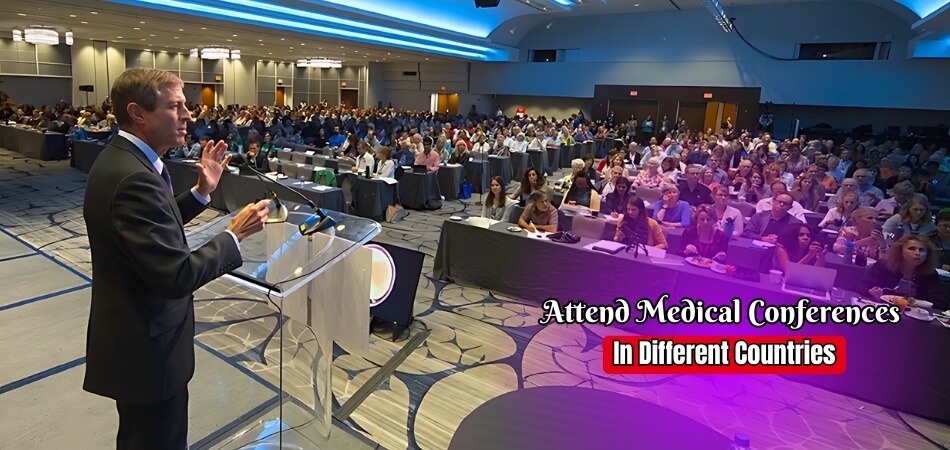Having the chance to attend medical conferences is an invaluable opportunity to learn about the latest advances in healthcare, network with fellow professionals, and improve your medical knowledge and skills. Globally, these gatherings serve as major platforms to communicate innovative research and clinical practices. If you are passionate about medical conferences, you might be thinking, “Can I attend medical conferences in different countries?”
Yes, you can attend medical conferences in different countries. Such opportunities allow learning, networking, and sharing of knowledge across international borders. Before packing your bags, check the visa requirements and registration details at your destination.
Would you like to know how to get the most out of these global learning opportunities? Continue reading this article for tips on managing international medical conferences effectively.
What’s So Special in Overseas Medical Conferences?
Unlike local conferences, overseas medical conferences offer unique learning environments. During this conference, experts from all over the world exchange insights and breakthroughs. This global perspective deepens your knowledge and exposes you to a variety of methodologies.

For example, attending a medical conference in Canada can connect you with healthcare technology pioneers. You might find new techniques or treatments in Canada that are not yet available in your own country. These events also offer workshops where hands-on experiences are available.
Your professional relationships can be significantly boosted by networking at these conferences. During peer and mentor meetings, you may receive guidance or have opportunities to collaborate in the future. Almost every conversation has the potential to lead to something great.
Can I Attend Medical Conferences in Different Countries?
Yes, you can attend medical conferences in different countries. This opens up a world of opportunities for professional growth and learning. By participating in international conferences, you expose yourself to the latest medical advancements and networking opportunities. Here is a step-by-step procedure for attending medical conferences in different countries:
Step 1: Research and Select a Conference
Begin by identifying conferences that align with your medical specialty or interests. Look for events that offer valuable workshops, keynote speakers, and networking opportunities. Be sure the conference is reputable and well-attended by professionals from around the world. Consider the event’s language to confirm you can fully engage.
Additionally, read reviews from past attendees to gauge the conference’s value and relevance. This research will help you choose an event that meets your educational and professional goals.
Step 2: Register for the Conference
Once you choose a conference, complete the registration process through the event’s official website. Registration fees may vary, and early registration often offers discounts. Check if the conference provides materials or access to sessions post-event. Some events might require professional membership.
It’s beneficial to verify the cancellation policy before completing your registration. This will give you peace of mind in case your plans change unexpectedly.
Step 3: Arrange Travel and Accommodation
Book your travel and accommodation well in advance to secure the best rates. For instance, international attendees planning on joining the Canada Medical Conference 2024 should choose flights that give them enough time to settle . Consider staying near the venue to save on transport costs and time. Many conferences have partnerships with hotels to offer discounted rates to attendees.
Also, explore options for local transportation, such as public transit or ride-sharing services, to make your commute easier. Planning your travel logistics thoroughly can improve your overall conference experience.
Step 4: Fulfill Visa and Entry Requirements
Determine if you need a visa to enter the host country. Getting a visa can be a lengthy process and requires documentation such as an invitation letter from the conference organizers. Make sure your passport is valid for at least six months beyond your travel dates. Check for any specific health requirements or travel advisories.
Additionally, gather all required documentation well ahead of time to avoid any last-minute issues. Being proactive with your visa application will help ensure a smooth travel experience.
Step 5: Prepare for the Conference
Plan which sessions and workshops you want to attend to make the most of your time. Prepare questions and topics for discussion to maximize networking opportunities. Pack business cards and other networking materials. Familiarize yourself with the conference schedule and venue ahead of time to optimize your experience.
Also, take time to research the speakers and topics beforehand so you can engage more effectively in discussions. Preparing in advance will help you feel more confident and ready to make the most of your conference experience.
Challenges You May Face While Attending Overseas Medical Conferences
While attending overseas medical conferences can be rewarding, it also comes with its own set of challenges. Being aware of these potential issues can help you prepare effectively and make your experience smoother.
Language Barriers
You might have trouble communicating and understanding because of language differences. This can affect your ability to fully engage in presentations and discussions. Misunderstandings may arise, making it harder to network and connect with other attendees. Consider learning a few key phrases in the local language or using translation apps to assist you.
Travel Complications
Long flights and layovers can lead to fatigue, which can negatively impact your conference experience. Unexpected travel issues like delays or cancellations can also disrupt your plans. It’s important to allow extra time in your schedule for travel-related contingencies. Keeping a flexible itinerary can help you adjust to any changes.
Cultural Differences
Unfamiliar social and professional etiquette can be challenging to manage. Different countries have varied norms regarding communication and interaction. To avoid misunderstandings, research cultural practices, and etiquette ahead of time. Being respectful and adaptable can improve your experience and help build rapport with international colleagues.
Visa Issues
Securing a visa can be a complex process that sometimes results in delays or denials. Always check the entry requirements before applying to ensure you have all the necessary documentation. It’s wise to start the visa application process well in advance of your planned travel. Understanding the specific visa regulations can help reduce stress during your preparations.
Cost Concerns
International conferences can be costly, with expenses related to travel, lodging, and registration fees. Budgeting ahead is crucial to managing these expenses effectively. Look for sponsorships, grants, or discounts that can help offset costs. Having a clear budget will allow you to enjoy the conference without financial worries.
Time Zone Adjustments
Jet lag can significantly impact your alertness and participation in the conference. Understanding how to handle jet lag is important when attending international medical conferences. Try to arrive a few days early to adjust to the new time zone. Staying hydrated and maintaining a regular sleep schedule can help mitigate the effects of jet lag.
Tips for Maximizing Your Experience at Overseas Medical Conferences
Taking part in overseas medical conferences is a great way to learn and network. To make the most of these events, careful planning, and strategic participation are essential. Here are some practical tips to maximize your experience:
Plan Your Schedule Wisely
Review the conference agenda early to identify key sessions and speakers. Prioritize events that align with your interests and professional goals. Allow time for spontaneous meetings and exhibit visits. Balance your day to avoid burnout and retain information.
Engage Actively in Sessions
Ask questions to clarify points and deepen your knowledge. Participating in discussions and exploring various activities to engage in at medical conferences helps share your knowledge and perspectives. This engagement helps improve learning and makes sessions more interactive. It also increases your visibility among peers.
Network Intentionally
Set clear networking goals before attending the conference. Identify people you want to meet, such as leaders in your field. Use coffee breaks and social events to initiate conversations. Follow up with new contacts post-conference to maintain connections.
Explore Cultural Opportunities
Take advantage of the host country’s local culture during your visit. Attend cultural events or tours organized by the conference. Knowing the local context can enrich your overall experience. It also provides a refreshing break from conference schedules.
Stay Organized and Prepared
Carry a light bag with essentials like a notepad, business cards, and chargers. Download the conference app to keep up with real-time updates and networking. Be sure that all travel documents are easily accessible. Staying organized helps you focus on the event without distractions.
How to Prepare for an International Medical Conference?
Preparing for an international medical conference requires careful planning. A well-thought-out approach can better your experience and ensure you make the most of the event, especially for medical professionals participating in conferences who aim to enhance their knowledge and network. Here are key steps to help you prepare effectively.
Research the Conference Agenda
Start by reviewing the conference agenda thoroughly. Identify sessions, workshops, and speakers that align with your interests and professional goals. This will help you prioritize which events to attend. Familiarizing yourself with the schedule allows you to plan your time efficiently during the conference.
Set Clear Objectives
Before the conference, set specific goals for what you want to achieve. Consider networking with professionals, learning about new advancements, or exploring collaboration opportunities. Writing down these objectives will keep you focused throughout the event. Clear goals help guide your choices and interactions, maximizing your overall experience.
Arrange Travel and Accommodation
Book your flights and accommodations well in advance. Look for options that fit your budget and schedule. Choosing a hotel near the conference venue can save you time and transportation costs. Ensure your travel arrangements allow for any potential delays or changes.
Prepare Your Materials
Gather all the necessary materials you will need during the conference. This includes business cards, a notebook or digital device for taking notes, and any presentation materials if you are speaking. Being organized with your documents will reduce stress and help you focus on learning and networking.
Stay Updated on Travel Requirements
Check visa and health requirements for traveling to the host country. Make sure your passport is valid for at least six months beyond your travel dates. Stay informed about any travel advisories or entry restrictions related to health. Understanding these requirements in advance will help you avoid any last-minute issues.
Frequently Asked Questions
This section provides answers to common questions about attending medical conferences in different countries. Understanding these details can help you plan effectively and make the most of your experience.
How Far in Advance Should I Register for an Overseas Medical Conference?
It’s recommended to register as early as possible to secure discounts on fees and better accommodation options, as conferences can fill up quickly. Early registration often leads to savings, allowing you to allocate your budget more efficiently. Additionally, booking in advance gives you ample time to arrange travel logistics.
Do I Need Special Insurance for Attending Medical Conferences Abroad?
It’s advisable to check if your existing medical insurance covers international travel or consider purchasing additional travel insurance to cover medical emergencies and trip cancellations. Some policies may not extend coverage outside your home country, so verifying your benefits is crucial. Travel insurance can provide peace of mind, knowing you’re protected against unforeseen events.
How Can I Stay Updated on Any Changes or Updates to the Conference Schedule?
Regularly check the conference website for announcements or follow their official social media channels for real-time updates, ensuring you don’t miss any important changes. Many conferences provide newsletters or email alerts that can help keep you informed. Additionally, downloading any conference apps can facilitate easy access to schedule updates and notifications.
Are There Opportunities to Publish My Research Papers Based on Presentations Made at International Conferences?
Yes, many conferences offer proceedings or opportunities to submit extended papers to affiliated journals. This can provide a valuable platform for sharing your research with a wider audience. Make sure to check the conference guidelines for specific submission requirements and deadlines.
How Can I Make the Most of Poster Presentations at International Medical Conferences?
Check your poster to ensure it is clear, concise, and visually appealing. A well-designed poster can attract more viewers and facilitate better discussions. Be prepared to discuss your research with attendees, answering questions and providing insights into your work.
Conclusion
International medical conferences provide a unique opportunity to engage with the latest advances in healthcare and network with global peers. The process requires thoughtful preparation, from securing travel documents to managing costs and local customs.
Whether participating in hands-on workshops or exploring new research, these conferences facilitate personal and professional development. When it comes to “Can I attend medical conferences in different countries?”, it’s clear that with proper preparation, international conferences are enjoyable as well as valuable. If you pursue this path, you will be able to expand your professional horizons and dramatically deepen your knowledge of medicine.







